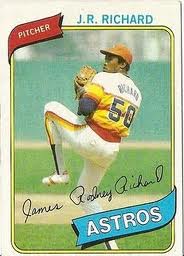I was enjoying this story about JR Richard, was was inducted into the Astros Walk of Fame at Minute Maid on Friday night, until I got to these paragraphs:
The Astros have been more liberal than most teams in retiring numbers, and the list of pitchers so honored includes Larry Dierker, Nolan Ryan, Mike Scott and a pair who died prematurely in Don Wilson and Jim Umbricht.
Richard hopes his No. 50, which has been given to nine players and now bullpen coach Craig Bjornson since Richard retired, will be next.
“When it happens, it happens, but I would like it to happen as soon as possible,” Richard said. “And the reason why I don’t think I’m speaking out of turn is because when you look at the statistics, my number should have been the first one retired.”
Team president George Postolos said in an email Thursday the one embedded in Texas Avenue is the only honor on the table right now.
“For this season, we are going to keep the focus on the Walk of Fame and the celebration of our 50th anniversary, and we are very pleased with how the program has worked so far,” Postolos wrote.
He added he is pleased with Richard’s work at the Astros’ Urban Youth Academy and other charity events.
Richard hopes to work in a more permanent role for the Astros and said he had brief conversations with the new regime upon its arrival but nothing has materialized.
“I ask. I’m not to the point of begging,” he said, adding that his goal is to “enhance the younger ballplayers or whatever the case may be. To be able to fit in and hold a part and a position. … Not just to be there.”
I had to do a doublecheck, but sure enough Richard’s #50 is not one of the Astros’ retired uniform numbers; that list will likely be augmented by Lance Berkman and Roy Oswalt at some point down the line. My mind absolutely boggled at the thought that Richard had not yet been so honored. It’s not just that he was a very good pitcher for a five year stretch from 1976 to 1980, it’s also the tragedy of what might have been. It’s not hard to imagine him following the path of Randy Johnson, another tall, dominant, late-blooming flamethrower who became an elite hurler after gaining better control over his pitches, and finishing a Hall of Fame caliber career a decade later with 250+ wins and 3500+ strikeouts. (It’s also not hard to imagine arm trouble finishing him off by the time he was 33 – he’d thrown a whole lot of innings over those five seasons – or given his rocky relationship with team management a trade or free-agent departure to a stadium that wasn’t as pitcher-friendly as the Dome.) But sometimes these things are about more than just the numbers. Richard was a one of a kind pitcher, with a unique and compelling life story following the stroke that ended his career and nearly killed him. He’s an indelible part of Astros history. They should fully embrace that. John Royal, who I must say is wrong about Jimmy Wynn, an excellent and vastly underrated hitter whose numbers were completely obscured by the hitters graveyard and deadball era he played in, agrees.


I am in complete agreement about retiring Richard’s number. I remember being in college in the fall on 1980 and talking baseball with a classmate (that also happened to become a major league ball player – Wally Joyner.) I was talking about how great a pitcher JR was and comparing him with Gibson from the Cardinals. When Wally said something that not in agreement with my feelings I told him to talk to his friend Dale Murphy when he went home for Christmas break and ask if JR’s 100+ fastball screaming a few inches past any body part didn’t give a seconds pause. Needless to say, that did put an end to that conversation.
Man, I remember those Dodgers-Astros pitchers’ duels in those days. Richard scared me when he pitched, because I knew the Dodgers were unlikely to get more than one or two runs (and this was the Cey-Russell-Lopes-Garvey era). Our pitchers had to be really on top of their game to beat him.